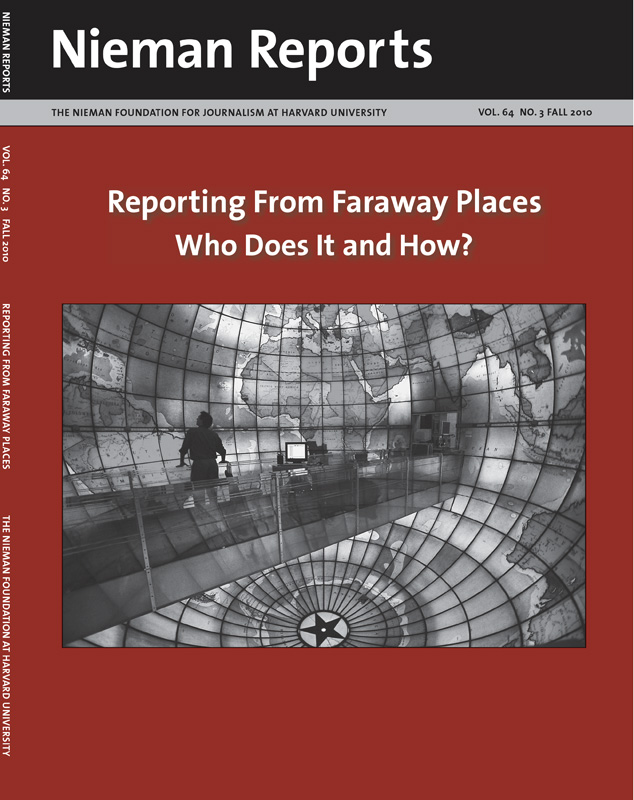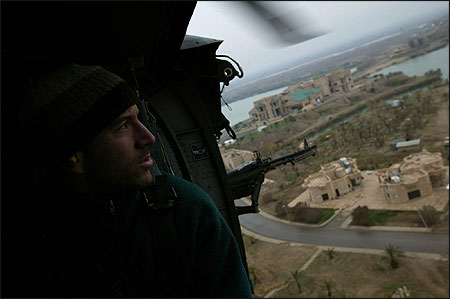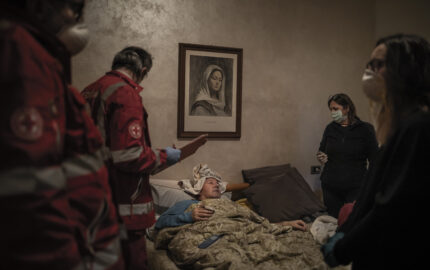

Phil Zabriskie in a U.S. military helicopter above one of President Saddam Hussein’s former palaces in Tikrit, Iraq, days after U.S. forces captured Hussein. Photo by Yuri Kozyrev.
Early in 2008 I came back to the United States after living and reporting overseas for seven years in Asia and the Middle East. It didn’t take long for the reality to sink in of how different it was being “over here” and how thoroughly my time “over there” had shaped my interests and habits. Every morning I’d look first at the international news in American papers, then scour the Web sites of The Independent, the Jakarta Post, The National, Tehelka, Ha’aretz, MindaNews or TamilNet. Or I’d read reports from the International Crisis Group or Moby Capital’s regular collections of Afghanistan and Pakistan bulletins.
Even now, I’ll often go to sleep or wake up thinking about something that’s happening over there. It has remained my everyday language, even though the daily conversation over here just isn’t the same and despite the fact that the tactile sense that comes with physically being in those places is impossible to recreate.
I came back willingly and gladly, but I do miss those long drives on bumpy roads, those tense moments in interviews with government officials or religious leaders, those drinks with colleagues at the end of a long day, and those times when I’d come around a corner to see something I’d never seen before. And I wonder how people I met and shared extremely meaningful experiences with are doing, worrying about some and hoping they are safe and content.
But it’s more than simple nostalgia, more than friendly concern. It’s the sense that something that was so central to me for so long, something that became a part of my identity, is no more.
Not surprisingly, perhaps, I often found myself seeking out places where “over there” and “over here” converge, where the massive movement of people around the world is clearly evident—Chinatown, for example, or neighborhoods in Queens that are nearly as South Asian as South Asia itself. I’ve also done lengthy spells of reporting on Nepali Bhutanese refugees being resettled in the Bronx, Cameroonian and Ethiopian asylum seekers in the Washington, D.C. area who’d been tortured in their homelands before fleeing, and soldiers and Marines returning from deployments in Afghanistan and Iraq.
I continued going abroad to work as well, returning to Afghanistan and Jerusalem, for instance, and making my first trip to Russia. But whether it was timing or simply that I wasn’t that good at foreign news freelancing out of New York City, it kept getting harder to do these stories. I made sure to pepper my story proposals with assertions that I knew how to keep costs low wherever I was. But I still heard often that certain ideas, especially those that involved flying halfway around the world, paying a fixer/translator, and spending a significant block of time (and money) in some faraway land were just too expensive to commission, at least from me, at least at this time. The answer might be “maybe,” if someone else picked up part of the tab or if the publication had not already done, say, an Africa story that year, or if there were more Americans involved. But otherwise, it wasn’t going to happen.
Dispiriting though it was, I had to start looking at other possibilities. Again, though, I hoped to find something that built on my experiences overseas. And one day I noticed that Doctors Without Borders needed a managing editor to oversee publications and its Web site. It was an organization I knew and respected from the field. This job held the promise of some stability, which at the time was very attractive, and travel to places I very much wanted to go. I applied and was hired, starting the day after the earthquake in Haiti. It was a whirlwind beginning, tracking and chronicling a large-scale, complex response to that devastating event. The frenetic atmosphere was comforting, though. It felt familiar.
I can still write, too, which is great. I can’t write about countries where the organization has missions, which rules out some of my favorite places. And time is an issue. But I have been able to get assignments on topics that are connected in some way to things I’d done or that involve familiar dynamics and struggles. Thus far that’s meant, among other things, profiling gay soldiers serving under “don’t ask, don’t tell” and following education projects in inner city Baltimore. And, of course, I’m still looking for that great book idea.
It’s hard and at times unsettling to have only one foot, or a couple of toes, in journalism, especially when I see that, for instance, Afghanistan, a place I’ve been a dozen times, is the story of the day. But I made my choice to come home and the ground shifted. That part of it is not so much different from life overseas when, more often than not, there was no choice but to adapt to circumstances, whatever they were.
I love reading stories and seeing photographs by colleagues who are still out there, watching them demonstrate why being there, seeing things up close (not from a desk in a TV studio somewhere) still matters. I do get envious, but for the moment, this job feels right and the work worthwhile. Soon I will be able to travel to places that interest me, and that will feel good, even if it’s not to as many places as I’d like to get to or how I imagined I’d get there.
Phil Zabriskie, who is managing editor for publications for Doctors Without Borders USA, spent 2001 through 2008 in Asia and the Middle East working as a staff writer for Time and freelancing for National Geographic, National Geographic Adventure, The Washington Post Magazine, and others.


